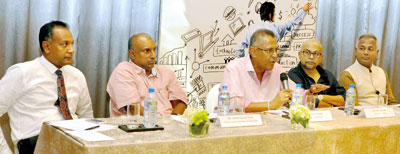Politics has ruined sports in Sri Lanka
Sports in Sri Lanka is facing crisis proportions with the biggest problem being that politicisation has crept into sports administrations amidst a generation who are talented but don’t have opportunities.

Panellists at the discussion. Pic by Priyantha Wickramarachchi .
These issues emerged at the monthly meeting Sunday Times Business Club (STBC) held at the Movenpick Hotel in Colombo during a discussion by an eminent panel on the crisis in sports.
Aravinda De Silva, the former Sri Lanka Cricket Captain and administrator opened the discussion by elaborating on what plagues Sri Lanka cricket. He was very forthright expressing his thoughts on the subject. He said he started playing cricket for his school when he was nine years old and continued to play because of the passion that he had for the sport.
“Kids today also play cricket knowing that there is a future for them in the sport.” He said what he learned from the cricket field was far more than what he learned in the classroom. The skills that he developed over the years from cricket had helped him to carry on with a business working with a large number of corporate bodies and more so by understanding individuals. He said the government has to realise the importance of sports. “If the government has a vision in developing sports, lots of things might fall into place.”
He said the kids today get addicted to drugs and violence because they feel that they have no future after finishing their Ordinary Level examination.
“If kids can build a career in sports that is an area where the government should focus their attention on,” he said adding that over the years Sri Lanka has not achieved much in terms of world class athletes.
He emphasised the need to lay a foundation in schools for kids to progress in sports.
Coaches today do not have the same enthusiasm that coaches in the past had in grooming kids to become better players. However other factors such as interferences from parents impede kids’ progress. “We need to eliminate that completely from school level.”
He said the person who has the right talent is not given the opportunity and if “we keep on doing this we will not” find the right type of individual in the future. “We cannot say that we do not have talent but we have to nurture kids’ talent. I see this as a problem and the issue is at grass root level where we have to rectify this.”
Chairman Jetwing Group, Hiran Cooray analysed the problem by saying that both cricket and businesses have been affected due to multitude of reasons in recent times. The role of the private sector in bringing back dignity to sports was of paramount importance.


He said when he played for his school the motto was playing was one thing and winning was not at any cost. Referring to the corporate sector performance he said it was all measured by the profits they make. “If you are to succeed you have to make money. Ethics, sustainability and looking after the community cannot be written down in a balance sheet. So the bottom line is measured by profits the company make.” Referring to sports he said whether it is rugby, football, cricket or boxing the success (unfortunately) is measured by winning.
He said making money should not be the only criteria for a corporate executive. They should also look after the local community and the environment and these matter. ”There is so much money in sports and in businesses today that people tend to forget dignity. Yes, I agree outstanding sportsmen should be paid a good wage as their time is limited for 10-15 years on the field.”
The crisis in sports today is also happening in the corporate sector, he said.
Chairman of Hela Clothing, Dian Gomes speaking on the education structure and sports in schools said that favouritism was rampant in schools although he was too young to understand it when he was dropped from the vice captaincy of the cricket team.
He said both the value system and patriotism begins at school. “There is a lot of interference from parents as well.”
He said the Education Ministry and the people who are running school association should have a proper structure in building national athletes. He emphasised inculcating value systems in schools to produce national sportsmen. “There is lot of money where cricket is concerned and the government pours a lot of money into athletics. But other sports do not have a dog’s chance.”
Referring to boxing he said it was a tough sport based on meritocracy. The funding for boxing comes from private and corporate sponsors and others. “Cuba as a smaller nation wins the highest number of medals at international competitions. They start at the school level finding talent and putting them through a process by putting them into sporting schools and fund them through the university system.” Referring to hooliganism displayed by sportsmen in the sports field he said the sponsors of such events should not hesitate to pull out of their sponsorship.
Chairman –Foundation of Goodness, Kusil Gunasekera speaking on the issue of politicisation, said that having worked in four interim cricket committees it was safe to say sports in the country is politicised.
Referring to the Sri Lanka Cricket constitution he said that it should be amended forthwith to change the current voting pattern. Although the Minister of Sports invited former five cricketers to join the committee to put things right they all declined because previous efforts too had failed to change the constitution during the period of the former Sports Minister.
He said there is lot of talent in many rural villagers that should be tapped. But it is lamentable when they are picked up to represent Sri Lanka abroad they have to find their own airfare and accommodation. “I have seen that they mortgage their house and property to represent Sri Lanka. When such kids come to us we foot their bill. It is politics that has ruined sports in the country.”


